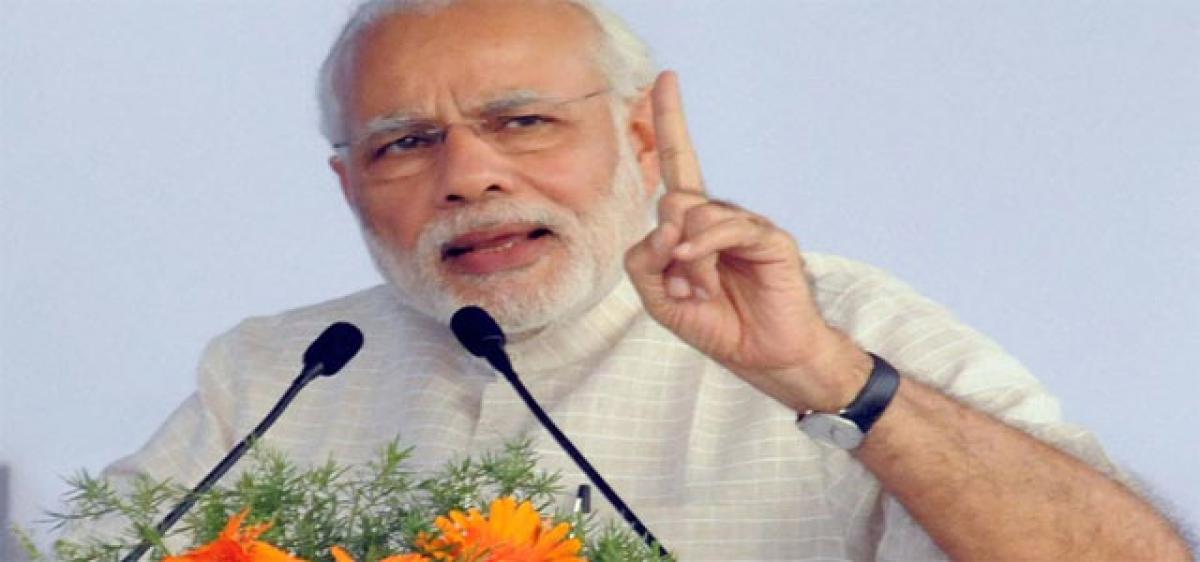Live
- National conference on digital change begins at SU
- Mathematics plays key role in different fields
- Plaint filed against FRO for obstructing MGNREGA works
- Two students drown
- Udandapur Reservoir oustees assured of fair rehabilitation package
- IPS officers’ suspension extended for six months
- Endowments officials inspect Jogulamba temple amid allegation of mismanagement
- ‘Pending bills for village panchayats must be cleared immediately: Sarpanches
- Blitzkrieg begins at PB Siddhartha
- US flays India’s 150% alcohol tariff amid trade concerns

Prime Minister Narendra Modi\'s shock ban on high-value banknotes will hit the war chests of his rivals before a key state election next year, sparking accusations that his strike against \"black cash\" will unfairly boost his party\'s chances.
New Delhi : Prime Minister Narendra Modi's shock ban on high-value banknotes will hit the war chests of his rivals before a key state election next year, sparking accusations that his strike against "black cash" will unfairly boost his party's chances.
Opposition politicians are scrambling to redraft campaign plans ahead of the ballot expected early next year in Uttar Pradesh, a state of more than 200 million people which will be crucial to Modi's long-term plan for re-election in 2019.
The PM last week outlawed 500 and 1,000 rupee notes in a drive to rein in corruption and a shadow economy that accounts for a fifth of India's $2.1 trillion gross domestic product.
With no state election funding, illicit cash is the lifeblood for political parties that collect money from candidates and businessmen, and then spend it to stage rallies, hire helicopters and hand out "gifts" to win votes.
Spending on the Uttar Pradesh election is forecast to hit a record 40 billion rupees ($590 million), despite the cancellation of big notes. Modi's demonetisation drive has so far proven popular among increasingly aspirational voters who are tired of corruption, although views among the broader population and economists are divided over the efficacy and fairness of the move.
Opposition politicians have united to decry it. For Modi, winning India's main battleground state is vital to strengthen his party's position in the Rajya Sabha, where it is still in the minority, before seeking a second term in the 2019 general election.
"Their calculation is that this is going to hurt everybody, but in relative terms the BJP is going to come out stronger," said Milan Vaishnav, a South Asia expert at the Carnegie Endowment for International Peace in Washington.
According to the Delhi-based Centre for Media Studies (CMS), which tracks campaign financing, the BJP relies on cash for less than two-thirds of its funding in a state like Uttar Pradesh. Its regional rivals use cash to cover 80 to 95 per cent of campaign spending.
Demonetisation will force Congress to hold smaller rallies, said Mathur, and there will be fewer "freebies" for voters. In a bid to limit the squeeze, parties are paying workers to queue at banks and swap old notes for new ones and evade scrutiny from tax inspectors, said party activists in Mathura. Event managers, whose businesses usually boom at election time, are worried.
"No political party except the BJP wants to organise big rallies before January. All of them depend on cash," said Rajesh Pratap, who has provided loudspeakers, outdoor air conditioners and security to party rallies for over a decade.
While an immediate liquidity crunch for parties is clear, the longer-term impact on funding is less so. The symbiosis between businessmen seeking favours and parties needing cash has sent campaign funding soaring.
In Andhra Pradesh, three in four voters reported receiving money from parties during the last general election, according to research by CMS. The group's chairman N. Bhaskara Rao describes electoral corruption as "the mother of all corruption" in India.
In the 2014 election, when Modi swept to power with an electrifying campaign that included 3D holograms of him giving speeches in villages across India, parties spent a record 370 billion rupees ($5.4 billion), CMS estimated.
By Rupam Jain & Tommy Wilkes

© 2025 Hyderabad Media House Limited/The Hans India. All rights reserved. Powered by hocalwire.com







